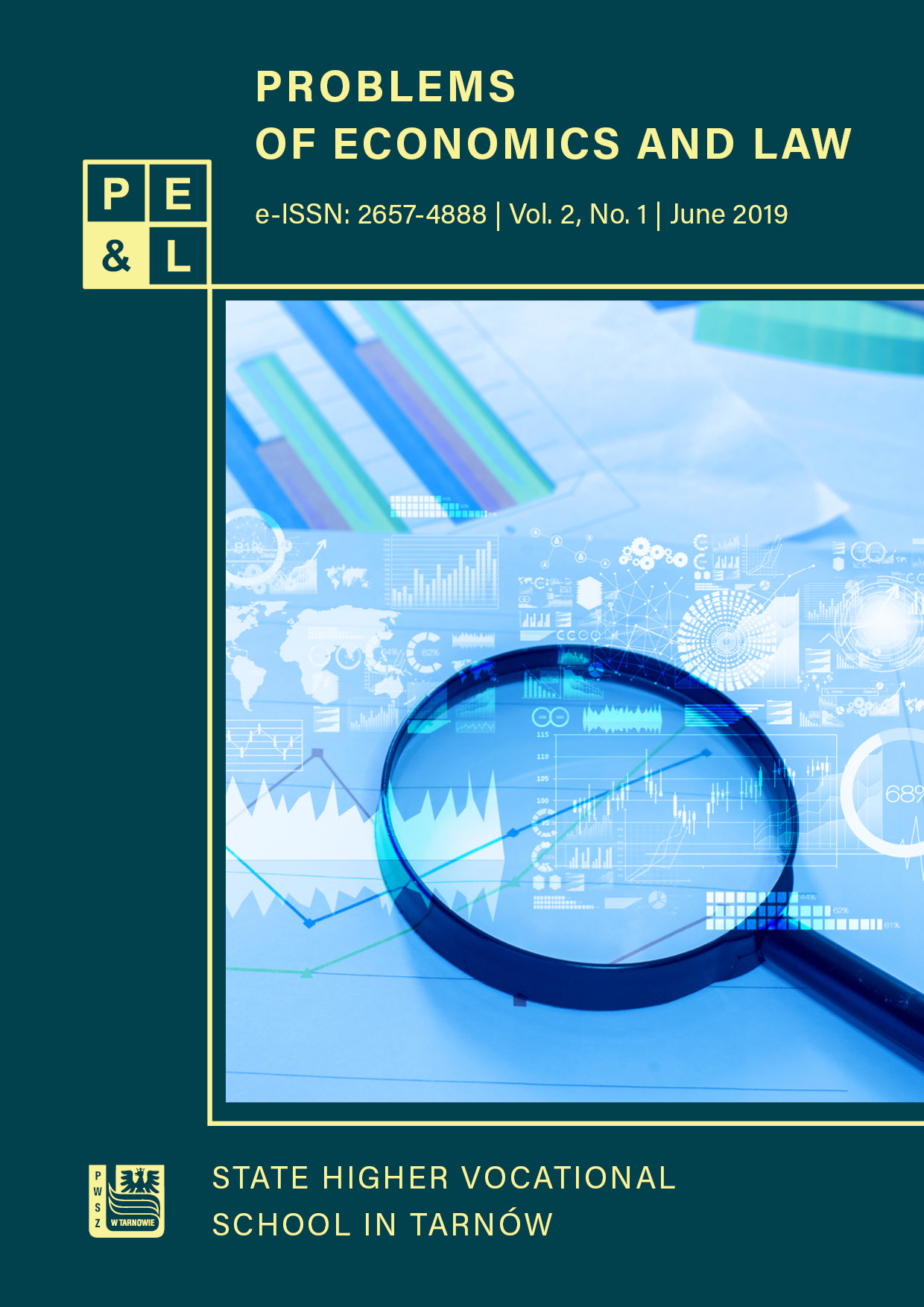Evaluation of the European Union investment interventionism effectiveness in the context of Visegrad Group countries economic development in the years 2000-2017
DOI:
https://doi.org/10.5604/01.3001.0013.2668Keywords:
European Union expenditure, economic developement, employment, Visegrad Group, European Union investmentAbstract
Aim of the study: The aim of this work is an attempt to assess the effectiveness of the European Union's investment interventionism based on the relationship between GDP per capita and total EU expenditure for a given country of the Visegrad Group in the years 2000- 2017.
Materials and methods: The empirical study used the annual frequency data from the European Union budget for the years 2000-2017 and World Bank data on the Gross Domestic Product per capita in a given year. The study part uses scatter plots of selected variables and the Pearson correlation coefficient.
Results: The results of the research allowed to indicate the tendency of the occurrence of interdependence between the EU expenditure and GDP per capita for the adopted time series.
Downloads
References
Ambroziak E., Wpływ integracji europejskiej na wzrost gospodarczy, Studia prawno-ekonomiczne, t. 94, Łódź 2015. Google Scholar
Andrzejewski P., Szczepaniak M., Państwa Grupy Wyszehradzkiej – obraz gospodarczy, Przegląd Zachodni nr 4, Poznań 1995. Google Scholar
Bobowski S., Polityka spójności Unii Europejskiej jako narzędzie interwencjonizmu unijnego w świetle teorii ekonomii, [in:] Wybrane problemy gospodarki światowej pierwszej dekady nowego wieku, W. Michalczyk (ed.), Uniwersytet Ekonomiczny we Wrocławiu, Wrocław 2009. Google Scholar
Breska E., Komisja Europejska, Dyrekcja Generalna ds. Polityki Regionalnej, Inwestowanie w przyszłość Europy, piąty raport na temat spójności gospodarczej, społecznej i terytorialnej, Luxembourg 2010. Google Scholar
Deklaracja o współpracy Czeskiej i Słowackiej Republiki Federacyjnej, Rzeczypospolitej Polskiej i Republiki Węgierskiej w dążeniu do integracji europejskiej,15.02.1991. Google Scholar
Dostál V., From Integration to Differentiation: The Czech Republic in the European Union Ten Years On, DGA Panalyse nr 9, 05.2014. Google Scholar
Europa.eu, Czechia: Budgets and Funding, https://europa.eu/ [access: 28.04.2019]. Google Scholar
Europa.eu, EU expenditure and revenue 2014-2020, http://ec.europa.eu/ [download date: 23.04.2019]. Google Scholar
Europa.eu, The history of the European Union – 2004, https://europa.eu/ [access:28.04.2019]. Google Scholar
European Commission, Biała Księga w sprawie przyszłości Europy, Refleksje i scenariusze dotyczące przyszłości UE-27 do 2025 r., Brussels 2017. Google Scholar
European Commission, Economic forecasts Autumn 2006, European Economy No 5/2006. Google Scholar
European Commission, Economic forecasts Autumn 2007, European Economy No 7/2007. Google Scholar
European Commision, Plan inwestycyjny dla Europy z dnia 26 listopada, Brussels2014, https://eur-lex.europa.eu/ [access: 28.04.2019]. Google Scholar
European Investment Bank, Evaluation of the European Fund for Strategic Investments, 31.06.2018. Google Scholar
Eurostat news release, European demography: EU28 population 505.7 million at 1 January 2013, 20.11.2013, https://ec.europa.eu/ [access: 28.04.2019]. Google Scholar
Firlej K., Mierzejewski M., Analiza nowych form procesu integracji europejskiej, Tarnowskie Colloquia Naukowe nr 5 (1/2018), PWSZ w Tarnowie, Tarnów 2017. Google Scholar
Garncarz J., Kształtowanie się nierówności społecznych a wzrost gospodarczy w krajach Grupy Wyszehradzkiej w latach 1991-2016, „Rynek – Społeczeństwo – Kultura” nr 2(28) 2018. Google Scholar
Grycuk A., Russel P., Członkostwo w Unii Europejskiej a rozwój gospodarczy Polski. Wybrane zagadnienia, Biuro Analiz Sejmowych nr 12(235), 25.10.2017,http://orka.sejm.gov.pl/ [access: 28.04.2019]. Google Scholar
Havlat M., Havrlant D., Kuenzel R., Monks A., Economic Convergence in the Czech Republic and Slovakia, Publications Office of the European Union, Luxembourg 2018. Google Scholar
Index.hu, Belpolitikai válság percről percre, https://index.hu/ [access: 28.04.2019]. Google Scholar
Instytut Europa Karpat, Grupa Wyszehradzka – historia i przyszłość, http://www.europakarpat.pl/ [access: 28.04.2019]. Google Scholar
Kozak M., Polska polityka spójności – wyzwania, (w:) Pancer-Cybulska E., Szostak E. (ed.), Polityka spójności w okresie 2014-2020 a rozwój regionów Europy, Wydawnictwo Uniwersytetu Ekonomicznego we Wrocławiu, Wrocław 2011. Google Scholar
KPMG, A magyarországi európai uniós források felhasználásának és hatásainakelemzése a 2007-2013-as programozási időszak vonatkozásában, 02.03.2017,https://www.palyazat.gov.hu/ [access: 28.04.2019]. Google Scholar
Kryskova, L., Bezzwrotne i zwrotne instrumenty pomocy publicznej Unii Europejskiej dla przedsiębiorców, wystąpienie na IX Kongresie Ekonomistów Polskich, Warszawa 2013. Google Scholar
Kudełko J., Kierunki zmian w polityce spójności Unii Europejskiej, Zeszyty Naukowe nr 818 Uniwersytetu Ekonomicznego w Krakowie, Kraków 2010 Google Scholar
Meanwhileinbudapest.com, Hungary Without EU Funds, https://meanwhileinbudapest.com/ [access: 28.04.2019]. Google Scholar
Mierzejewski M., Interwencjonizm na liberalnych rynkach. O zmianach w spojrzeniu na gospodarkę w reakcji na kryzys pierwszej dekady XXI wieku, Rynek Społeczeństwo-Kultura nr 2(14) 2015, pp. 28-32. Google Scholar
Nazarko Ł., Polityka innowacyjna – inteligentny interwencjonizm?, Optimum. Studia Ekonomiczne, Nr 1 (73) 2015. Google Scholar
Pastuszka S., Polityka regionalna Unii Europejskiej – cele, narzędzia, efekty, Difin, Warszawa 2012. Google Scholar
Rada Europejska, Konkluzje Rady Europejskiej z dnia 26-27 czerwca, Brussels 2014,str. 16, https://www.consilium.europa.eu/ [access: 28.04.2019]. Google Scholar
Sejm, Zapis przebiegu posiedzenia komisji, Komisja Gospodarki i Rozwoju, 22.03.2017, http://www.sejm.gov.pl/ [access: 28.04.2019]. Google Scholar
The World Bank, Employment to population ratio, 15+, total (%) (national estimate), https://data.worldbank.org/ [download date: 23.04.2019]. Google Scholar
The World Bank, GDP per capita (current US$), https://data.worldbank.org/[download date: 23.04.2019]. Google Scholar
Traktat o Unii Europejskiej, Dz.U.2004.90.864/30. Google Scholar
Visegradgroup.eu, About the Visegrad Group, http://www.visegradgroup.eu/ [access:28.04.2019]. Google Scholar
Wybrane problemy gospodarki światowej pierwszej dekady nowego wieku, W. Michalczyk (ed.), Uniwersytet Ekonomiczny we Wrocławiu, Wrocław 2009. Google Scholar
Downloads
Published
How to Cite
Issue
Section
License
Copyright (c) 2019 State Higher Vocational School in Tarnow, Poland & Authors

This work is licensed under a Creative Commons Attribution-ShareAlike 4.0 International License.





